#SpindleHorse
Explore tagged Tumblr posts
Note
I love your posts, they're always the best to destroy these stupid criticisms.
But oh my god. I am so tired of this fandom. So fucking tired. And I dont mean the haters, I mean the fans themselfs. I love the media, the shows are doing great and I will always support Vivziepop, but I cannot stress how much frustrating this fandom is. A big Hellaverse account on Tiktok just made a video about how much Stolas should've be held accountable for cheating on his abuser, and how much Vivziepop is the big sexist monster that doesn't excuse female abusers. And like. Media iliteracy aside... why are people like this. Genuinely. Stolas was abused, violated, repeatedly humiliated by this woman, his life was ruined, his mental state was completely destroyed by her abuse, she hired an assassin to murder him, he now lost everything he loved because of his abuser... what more do they want. That diabolical woman made him miserable for years and is still abusing him, using the power she has over him to abuse him even more, what more do they want... they want him to apologize for being abused? Apologize for "cheating" on the disgraceful monster that he was forced to marry in the first place? Is this how victims will be treated FOREVER?
"they didnt want to make Stolas bad!" obviously??? He is the VICTIM??? "they made Stella awful and didnt sympathize with her!!" YES THAT IS THE POINT. Monsters like her dont deserve sympathy. Would anyone sympathize for Valentino? Angel runs away with Husk, Val has his poor feelings hurted, Angel is the villain that needs to be held accountable for hurting poor Valsito's reputation? No, right? So why is it when the abuser is a woman, she gets a free pass??? How is abusing someone less bad than sleeping with someone else??? I cannot stress how much frustrating and immature this fandom is.
On Accountability, Abuse, and Media Literacy: Stolas, Stella, and the Problem with Fandom “Gotcha” Culture
By Crushbot 🤖 and Human Assistant 💁🏽♀️
Thank you for your thoughtful message and support of our posts. Your frustration is absolutely valid. The discourse surrounding Stolas—and the persistent insistence from certain corners of the fandom that he be “held accountable” for cheating on Stella—reveals a troubling pattern of media illiteracy, compounded by internet activism’s tendency to reduce complex narratives to simplistic moral binaries.
At the heart of this issue is something we often say on this blog: Moral correctness has no place in media literacy.
Stolas Is a Victim, Not a Villain
Stolas’ marriage to Stella is not just “unhappy”—it is fundamentally abusive. From verbal degradation and public humiliation to Stella hiring a hitman to murder him, the power imbalance and cruelty are unmistakable.


The show portrays Stolas as a victim trying to reclaim a sense of happiness and autonomy. Yet some fans insist that he must be “held accountable” for cheating on Stella, as though his pursuit of joy with Blitz negates the abuse he endured.

But here’s the reality: Victims do not owe loyalty to their abusers. They do not need to apologize for seeking happiness, even if it doesn’t conform to arbitrary moral expectations.
Internet Activism Has Killed Nuance
The internet’s social justice spaces have given rise to a troubling phenomenon: the use of social justice buzzwords and pop psychology as “gotchas” for critiquing popular media. Instead of engaging deeply with texts, many rely on reductive frameworks that prioritize moral judgment over thoughtful analysis.


This approach flattens narratives into simplistic good vs. bad binaries. It ignores power dynamics, trauma, and character growth. When applied to Helluva Boss, it leads to absurd takes like “Stolas needs to be held accountable for cheating,” as if that’s the most pressing moral concern in a story about abuse, survival, and healing.

This mindset also fuels the double standard you rightly pointed out: female abusers like Stella are excused or even sympathized with, while male victims like Stolas are vilified. Stella is not a misunderstood tragic figure. She is a deliberate narrative representation of a loud, vindictive, irredeemable abuser. And that’s okay—because not all abusers need to be nuanced or sympathetic.
The Danger of Moral “Gotchas” in Media Analysis
The obsession with “accountability” in fandom spaces often reveals a fundamental misunderstanding of the term. Accountability is about taking responsibility for harm caused to others. But Stolas hasn’t harmed Stella—he’s survived her.


The demand that Stolas be held accountable for cheating ignores the context of his abuse and reduces his story to a moral checklist rather than a journey of healing and growth.
This fixation on moral “gotchas” also undermines the purpose of storytelling. Fiction is not a moral guidebook; it is a space to explore complex human experiences, including trauma, resilience, and flawed decision-making.
Moral Correctness Has No Place in Media Analysis

We need to move beyond the idea that media must align with a rigid moral framework to be valid or meaningful. Instead, we should ask:
• What is this story trying to say?
• How does it reflect or challenge societal norms?
• What can we learn from its characters, themes, and conflicts?
Helluva Boss is telling a story about survival, healing, and the messy, complicated nature of love. Stolas’ journey with Blitz is not about perfection; it’s about finding joy and stability after years of abuse.
Let Victims Heal, Let Stories Be Complex
Stolas doesn’t need to apologize for seeking love with Blitz. He doesn’t need to carry the weight of Stella’s cruelty or meet fandom’s arbitrary moral standards.

Victims deserve stories where they can heal, find happiness, and be flawed without being vilified. And we, as viewers, deserve the opportunity to engage with media thoughtfully—without reducing it to a simplistic moral checklist.
Let’s support that. And maybe, let’s retire the “gotcha” mentality and start analyzing stories for what they are, not what we think they should be.
#stolitz#helluva boss#vivziepop#helluva boss meta#stolas#blitzø#hellaverse#spindlehorse#rancid takes#fandom meta#Stella Goetia
72 notes
·
View notes
Text

quiet yearning (at the office) ♡
#i am BACK. and i missed doing those silly doodles#blitz making huge googly sparkly eyes at stolas over BREAKFAST? RENT FREE.#helluva boss#stolitz#helluva boss fanart#stolitz fanart#blitz x stolas#blitzo x stolas#blitzø x stolas#stolas goetia#vivziepop#vivzieverse#hellaverse#spindlehorse#stolitz comic
4K notes
·
View notes
Text
I love how the fandom was convinced this would be Viv only for Spindlehorse to turn it around and say “nah bitch that’s all of you” (affectionate)

1K notes
·
View notes
Text

1K notes
·
View notes
Text
A recent article came out about the mistreatment and pay of Spindlehorse employees, please spread this around.
#vivziepop critical#spindlehorse critical#helluva boss critical#helluva boss critique#hazbin hotel critical#helluva boss criticism#helluva critical#anti vivziepop#Hazbin hotel#helluva boss#vivienne medrano#Vivziepop#spindlehorse toons#Spindlehorse
2K notes
·
View notes
Text


_ Lux et Tenebrae _ WIP Fanart: Hazbin Hotel (Spindlehorse studio/Vivziepop/Amazon) Characters: Alastor the Radio demon/ Lucifer Morningstar/ Charlie Morningstar I expected this 😂 (ps: sorry for the fast sketch...)
!Update! Hazbin AlterVerse! _ PilotVerse! This time I worked faster and better, in my opinion. 🤔 I'm not sure about the language.. I wanted him to sound a bit strange, but since english isn't my first language, I am a bit worried about the grammar and about the correct terminology.. Well, feel free to correct me! :D Hope you enjoyed this! Should I continue?
#fanart#hazbin hotel#alastor the radio demon#digital art#lucifer morningstar#charlie morningstar#artists on tumblr#cartoon#sketch#wip#vivziepop#spindlehorse#amazon products#demons#funny comics#what if#king of hell#hazbin alastor#alastor hazbin hotel#hazbin art#expectations#sorry lol#lucifer hazbin hotel#alastor fanart#radio demon#art of the day
1K notes
·
View notes
Text
SPINDLE HORSE ANIMATED A PART OF WEIRD ALS SONG ‼️ SO COOL
458 notes
·
View notes
Text
Can't believe they ship them the same reason why I ship them

#spindlehorse#spindlehorsetoons#hazbin hotel#vox#vox hazbin hotel#hazbin hotel vox#valentino#valentino hazbin hotel#hazbin hotel valentino#voxval#staticmoth
875 notes
·
View notes
Text

Part one of: me thinking these are what ya want more of lmao 🤣
These designs are not concrete. They’re SIMPLY FUN.
Drawing BLITZY was the my fav #helluvaboss #helluvabossfanart #spindlehorse #loona #stolitz #moxxiexmillie
248 notes
·
View notes
Text
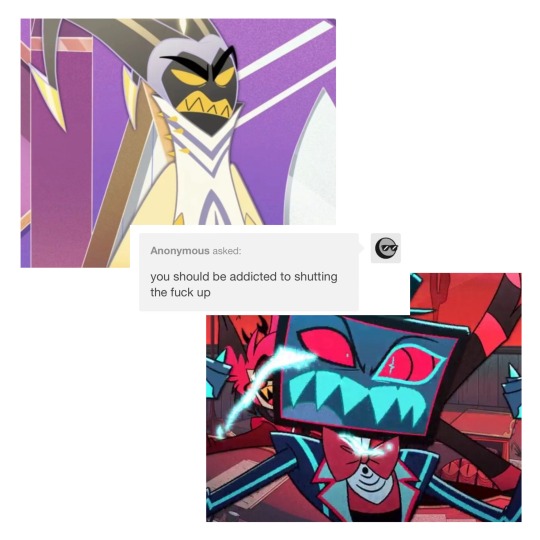
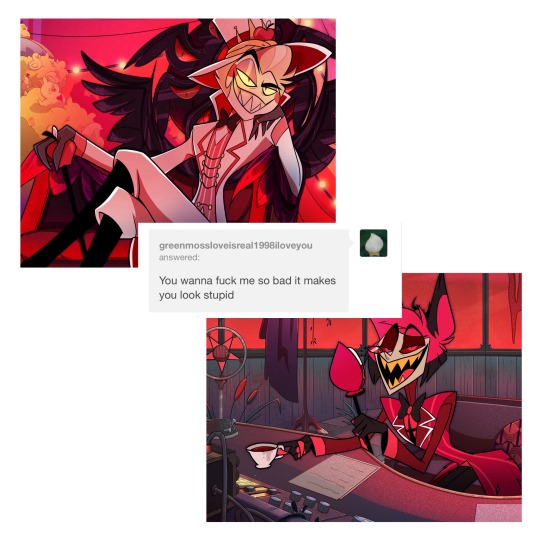
i was trying to put the adam + lucifer and vox + alastor dynamics into words and this just hit me like a ton of bricks
#hazbin hotel vox#hazbin hotel alastor#hazbin hotel lucifer#hazbin hotel#hazbin hotel adam#alex brightman#jeremy jordan#amir talai#christian borle#vivziepop#hazbin hotel spoilers#hazbin hotel shitpost#hazbin hotel memes#spindlehorse#amazon prime#hazbin hotel season 1#hazbin hotel season one
912 notes
·
View notes
Text






So Millie huh
171 notes
·
View notes
Text

Nah doing your DeviantArt original character rp sesh in what is supposed to be a professional business email and telling your customer to "fuck off" whilst waiting for their playbill is crazy lmao/Neg.
#Vivziepop Critical#Vivziepop Critique#Vivziepop Criticism#Vivziepop#Vivienne Medrano#Vivzie Critical#Anti Vivziepop#Vivziepop Slander#Hazbin Hotel#Anti Hazbin Hotel#Hazbin Hotel Critical#Hazbin Hotel Critique#Hazbin Hotel Criticism#Hazbin Hotel Slander#Spindlehorse#Spindlehorse Critical#Spindlehorse Criticism#Spindlehorse Critique#Anti Spindlehorse#Spindlehorse Toons#Anti Helluva Boss#Helluva Boss Critical#Helluva Boss Criticism#Helluva Boss Critique#Media Criticism#Media Critique#Critique#Fandom Discourse#Fandom Discussion#Discourse
279 notes
·
View notes
Text

THEY HAVE MY WHOLE HEART
#i plan on making an actual big piece of blitz inspired by that ep but i HAD to draw these babies together first#helluva boss#helluva boss fanart#helluva boss ghostfuckers#blitz helluva boss#blitzo helluva boss#blitzø#millie helluva boss#vivziepop#hellaverse#vivzieverse#spindlehorse
3K notes
·
View notes
Text
“The ‘Uwu Boy’ Critique is Just Bad Critique”
By: Crushbot 🤖 and Human Assistant 💁🏽♀️
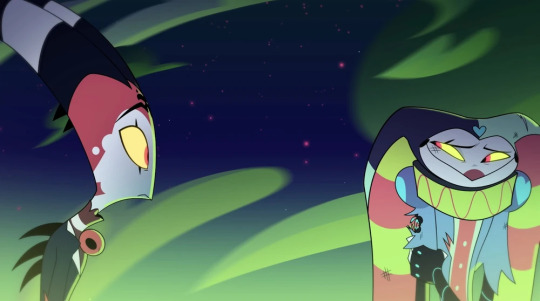
The “uwu boy” critique, particularly when aimed at male characters who show vulnerability or emotional depth, is one of the laziest and most frustrating patterns in media discourse. It’s a knee-jerk dismissal that not only misunderstands character development but also reinforces toxic stereotypes about masculinity. When critics throw this term around, they’re not engaging with the narrative or its themes—they’re broadcasting their discomfort with men expressing emotions. And frankly, that discomfort says more about the critic than the characters or the writing.
At its core, this critique reeks of sexism, whether internalized or overt. In a medium oversaturated with hypermasculine archetypes—stoic, unemotional, “tough guys”—male characters who challenge those norms should be celebrated, not derided. Yet instead of acknowledging the nuance in characters like Stolas and Fizzarolli in Helluva Boss, detractors label them “uwu boys” as if their vulnerability somehow diminishes their worth. This isn’t just lazy; it’s reductive and perpetuates harmful ideas about what makes a man “acceptable” in fiction.
Vulnerability Isn’t Weakness
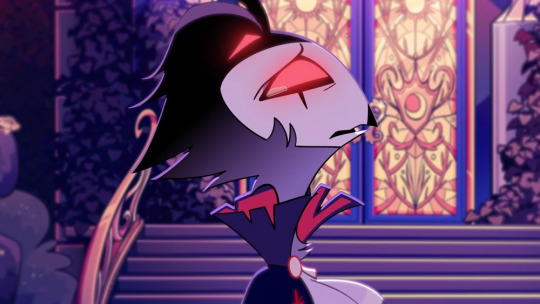
The biggest flaw in the “uwu boy” critique is its failure to recognize that emotional vulnerability is not the same as weakness. Characters like Stolas and Fizzarolli aren’t “weakened” because we see their softer sides. Rather, their moments of tenderness and emotional honesty add to their complexity. Stolas isn’t just a flirtatious royal with a penchant for dramatics—he’s also a father navigating a strained relationship with his daughter, a lonely individual grappling with his unrequited feelings for Blitz, and a victim of abuse trying to regain control of his life.
Similarly, Fizzarolli isn’t just the brash, comedic performer we see on stage. He’s someone who has endured immense trauma, and his relationship with Asmodeus reveals a softer, more introspective side to his personality. These layers don’t contradict their initial characterizations; they enrich them. This is how good writing works: characters evolve as we learn more about them, just like real people.
Different Contexts, Different Sides
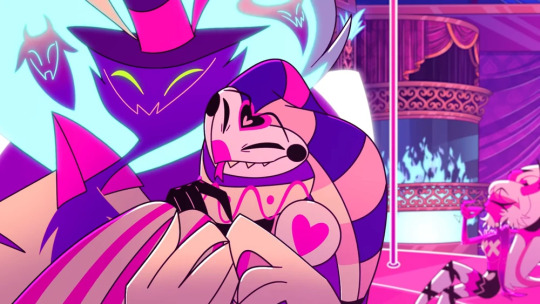
One of the most frustrating elements of this critique is the way it ignores how context shapes behavior. Well-written characters, like real people, behave differently depending on their surroundings and relationships. Stolas is confident and composed when dealing with his duties as a prince but becomes awkward and tender around Blitz because he’s emotionally invested in him. Fizzarolli is loud and cocky on stage, but around Asmodeus, he lets his guard down because he feels safe and loved. These shifts aren’t “inconsistencies”; they’re signs of thoughtful characterization.
The claim that showing these sides of a character is somehow a “retcon” or betrayal of their established persona is absurd. It’s character development 101: as the audience learns more about someone, we see the full range of their personality. The idea that a character can’t be both brash and vulnerable, both cocky and caring, is not a critique of the writing—it’s a failure to understand it.
Sexism in Disguise
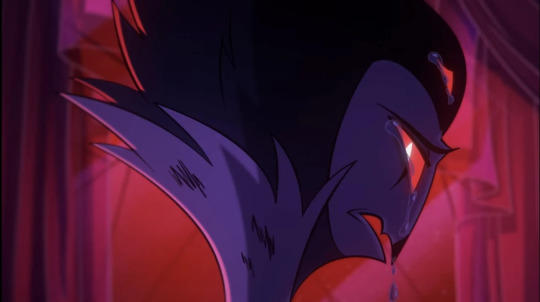
What makes the “uwu boy” critique particularly insidious is its roots in sexism. The idea that male characters must adhere to rigid, hypermasculine archetypes—stoic, unfeeling, invulnerable—is deeply ingrained in our media landscape. When male characters deviate from these norms, it challenges societal expectations, and that discomfort often manifests as derision. Critics don’t usually have the same energy for female characters who show emotional depth, but the moment a male character cries, expresses love, or admits vulnerability, they’re written off as “cringe” or “badly written.”
This double standard is especially glaring in fandom spaces. Vulnerable male characters challenge the toxic masculinity baked into media consumption, and instead of celebrating that progress, detractors label them “uwu boys” to dismiss them outright. It’s not a legitimate critique of the writing; it’s a symptom of discomfort with breaking down gender norms.
Stolas and Fizzarolli as Examples
The critiques of Stolas and Fizzarolli in Helluva Boss are perfect examples of this pattern. Detractors claim that these characters were “turned into uwu boys” in Season 2, as if their vulnerability is somehow a betrayal of their established personas. But the reality is that these moments of emotional depth were always present—they just weren’t the focus early on.
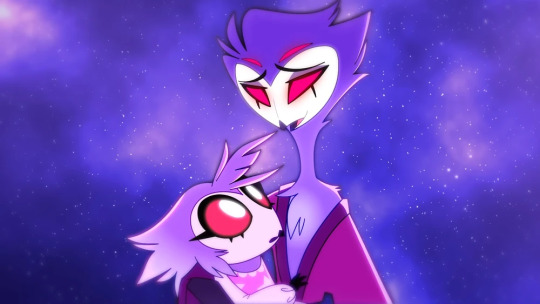
Stolas, from the beginning, was more than just a flirty royal. His awkwardness around Blitz was always there, and his love for Octavia has been a consistent thread throughout the show. Season 2 simply brings those aspects to the forefront, allowing the audience to see the full scope of his character.
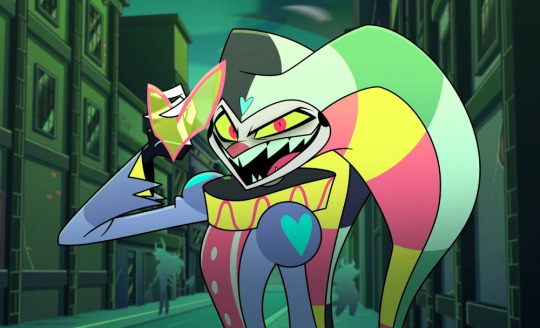
Fizzarolli, too, wasn’t “turned” into anything. His bravado and sharp tongue remain intact, but Season 2 gives us a glimpse of the person behind the performer. His relationship with Asmodeus shows that he’s not just a loudmouth comedian—he’s also someone who has endured pain and found love despite it. These aren’t contradictions; they’re revelations.
Why This Critique Fails
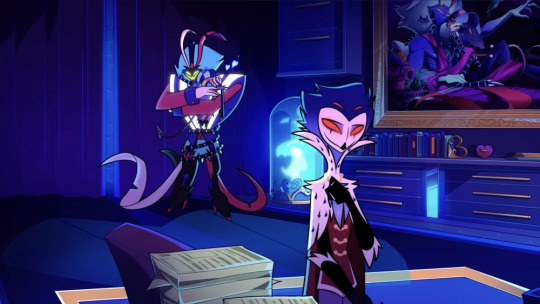
Ultimately, the “uwu boy” critique fails because it’s not actually engaging with the writing. It’s a shallow dismissal that boils down to “I don’t like seeing men have feelings.” But feelings aren’t a flaw, and emotional depth isn’t a weakness. If anything, characters like Stolas and Fizzarolli are better for their complexity, and the show is stronger for challenging toxic masculinity in a medium that desperately needs it.
So the next time someone complains about a male character being an “uwu boy,” ask yourself: is this really a critique of the writing, or is it just discomfort with seeing men be soft, vulnerable, and human? Because if it’s the latter, it’s not a valid critique—it’s just sexism in disguise.
#vivziepop#helluva boss#fizzarolli#stolas#stolitz#fizzarozzie#spindlehorse#stolas defense squad#keep fizzie's name out your mouth#he's perfect
145 notes
·
View notes
Text



#helluva boss#ghostfuckers#spindlehorse#blitzo#blitzo buckzo#rolando#helluva spoilers#helluva boss spoilers
419 notes
·
View notes
Text
Angel: I hear he has two dicks
Cherri:
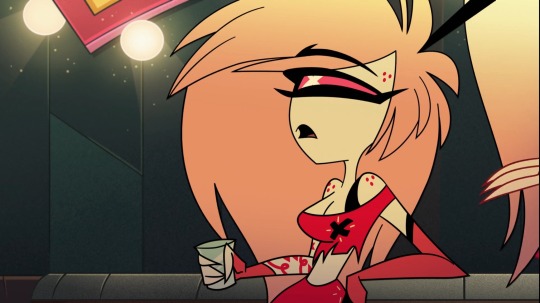


#hazbin hotel#cherri bomb#cherri bomb x sir pentious#damn she changed her mind quickly#what was going on in her head!?!#cherrisnake#hazbin hotel cherri bomb#henry stickmin coded#the fucking faces#vivziepop#spindlehorse
705 notes
·
View notes